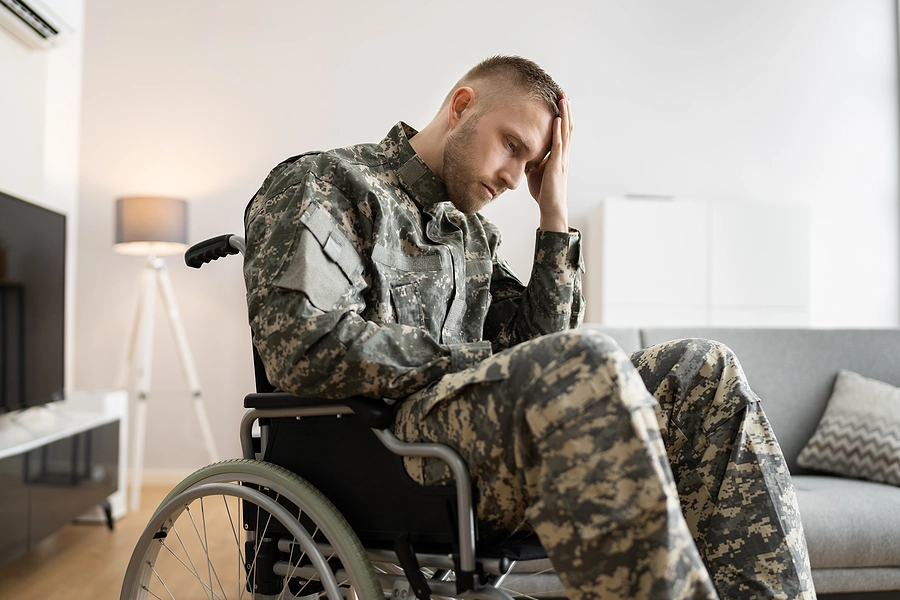
Is PTSD a Disability?
The VA provides compensation for veterans with service-connected Post-Traumatic Stress Disorder, as the symptoms of PTSD can significantly impair vets.
Summary
- The VA says that PTSD is a disability, so veterans with service-related PTSD or PTSD secondary to a service-connected condition can seek VA disability benefits.
- Veterans need to provide documentation of an official PTSD diagnosis and prove the stressor occurred during military service.
- PTSD symptoms like nightmares, insomnia, and flashbacks can significantly impair a veteran’s daily life, harming their careers, relationships, and overall health.
- VA-accredited attorneys can assist veterans in navigating the complex VA claims process, ensuring they receive the benefits they deserve.
While the stigma attached to mental health conditions like PTSD has lessened over the years, many veterans still question themselves about whether PTSD “counts” as a disability. At VetLaw, we are here to tell you that Post-Traumatic Stress Disorder can absolutely be a disability.
Further, service-related PTSD can qualify for VA disability benefits. Our team of dedicated veterans disability claims attorneys is sensitive to the unique needs of clients pursuing PTSD disability claims and is equipped to help them successfully secure VA disability benefits.
Get in touch with us by calling (855) 964-1925 or by filling out an online contact form. Our team will gladly assist you in scheduling a free consultation with one of our top-rated veterans disability benefits attorneys so you can discuss the specifics of your PTSD disability claim.
Vets With Post-Traumatic Stress Disorder Can File for VA Disability Benefits
The VA has acknowledged PTSD as a disability since the 1980’s. In fact, it is one of the top conditions claimed for VA disability benefits. Service-related PTSD is categorized as a mental condition, which is evaluated using a rating schedule ranging from 0% to 100%.
Vets must provide documentation of a formal PTSD diagnosis to secure a VA disability rating. To qualify for benefits in a PTSD disability claim, veterans have to prove that the source of their diagnosis occurred during their military service. This is known as the stressor.
For example, a vet who had pre-existing PTSD related to sexual abuse and experienced Military Sexual Trauma while serving would be eligible for VA disability benefits, even though they already had PTSD.
Veterans are also susceptible to developing PTSD from an experience they have while on active duty. The VA recognizes the following types of in-service traumatic experiences as grounds for disability benefits for PTSD:
- Sustaining or being in danger of sustaining a serious injury, like losing a limb
- Experiencing a personal trauma
- Surviving Military Sexual Trauma, including harassment and assault
- Experiencing a life-threatening incident, such as in combat
How the Symptoms of PTSD Can Be Debilitating for Veterans
Oftentimes, veterans coping with service-connected PTSD deal with a lower quality of life because the condition seeps into their relationships, careers, and health. For instance, both nightmares and insomnia are associated with PTSD.
These conditions can compromise the quantity and quality of sleep a veteran receives. Chronic sleep deprivation can negatively affect them in several ways. For example, they may:
- Struggle to concentrate at work, reducing their productivity or creating a dangerous work environment
- Become more irritable or agitated, putting strain on professional and personal relationships
- Develop physical and mental health issues, such as depression, heart disease, and obesity
Flashbacks, another major symptom of PTSD, can prove disabling when a vet cannot differentiate their memory from reality. Not only can this be emotionally distressing for the veteran and those who witness the episode, but it can also be physically dangerous.
Veterans who are in the midst of a PTSD flashback may mistake others as threats and lash out, unintentionally hurting others. Alternatively, a vet may fail to identify hazards, like a car headed towards them, and injure themselves.
Given these symptoms, it is no surprise that many vets with PTSD also suffer from heightened anxiety and symptoms that can mirror depression. Veterans with PTSD may go to extreme lengths to avoid certain triggers, resorting to inconvenient, frustrating, expensive, and even unsafe methods to do so.
Depend on VetLaw’s Expertise to Secure Benefits for Your PTSD Disability Claim
As veterans living with PTSD know, the symptoms of this mental condition can cost you in more ways than one. That’s why you need to harness the unparalleled legal support VetLaw offers clients across the U.S.
We can help you fortify your claim for VA disability benefits to compensate for the effects of your service-connected PTSD. Our team of VA-accredited veterans disability benefits denial lawyers is ready to take on any challenge to get you the benefits you need.
We are trustworthy, communicative, and determined to help you navigate the VA claims process with confidence. Start the process of appealing your PTSD disability claim with VetLaw by calling (855) 964-1925.
You can also fill out an online contact form to schedule a free consultation with us. Our veterans disability claims appeal attorney will walk you through everything you need to know about filing an appeal and offer insight tailored to your PTSD disability claim.
Frequently Asked Questions
How does the VA’s automatic 50% disability rating for PTSD work?
The VA does not automatically guarantee every veteran a 50% disability rating for PTSD. In addition to meeting the other eligibility requirements for VA disability, vets seeking this status must show that the military discharged them because of their PTSD symptoms.
Qualified veterans can hold an automatic 50% disability rating for PTSD for six months after that. Then, the VA will determine if the 50% disability rating is still appropriate. If you disagree with the VA’s updated disability rating for your PTSD, you can appeal for a rating increase.
What are common Secondary Conditions related to service-connected PTSD?
PTSD symptoms can present differently in each veteran. Other factors, like their individual and family medical history, access to healthcare, and level of support can impact their risk of developing secondary health issues related to their service-connected PTSD.
Here are a few examples of Secondary Conditions that can result from Post-Traumatic Stress Disorder:
- Eating disorders
- Anxiety
- Depression
- Migraines
- Erectile Dysfunction
- Hypertension
- Gastrointestinal issues
Is PTSD a presumptive condition?
You can’t claim PTSD as a presumptive condition simply because you served in the military. However, PTSD is a presumptive condition for certain service-related disabilities. For instance, veterans who have experienced Military Sexual Trauma (MST) can claim PTSD as a presumptive condition.
When evaluating the claim, the VA would accept that the vet’s PTSD is service-related without any additional documentation of a medical nexus, as long as the vet provided evidence of MST and a PTSD diagnosis.



